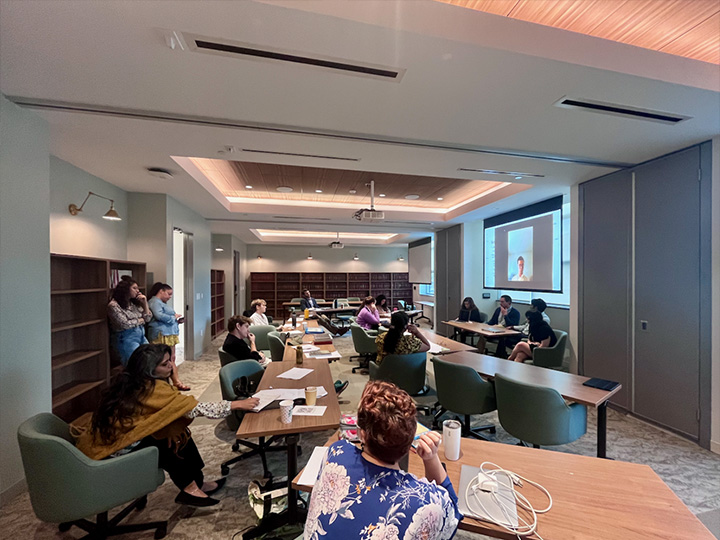
Late-medieval literary scholar Dr. Daniel Davies’s “Special Topics in Poetry: Premodern Poetics” class culminated in an all-day colloquium on December 7th, 2022—a mini-conference that captivated his graduate students across concentrations. The event, “De arte / ex arte: Medieval Poesis Then & Now,” provided a unique opportunity for students to present both critical and creative papers side by side and respond to each other’s research in a professional context designed to emulate an academic conference.
This hybrid creative and critical event was “so much more than end of term presentations,” Dr. Davies shared. In presenting their original work examining critical (de arte) and creative (ex arte) responses to premodern poetics—medieval stylistic practices, formal innovations, and theories of form—students engaged in deep explorations of the relationship between poesis and time.
FORWARD spoke with Dr. Davies and CWP graduate students Sara Kaplan-Cunningham and Pritha Bhattacharyya to better understand how they dealt with questions of historicity and creativity and the capaciousness of English as a discipline.
FORWARD: Dr. Davies, it’s fascinating to hear what an expert learns from his own students. Any insights from your colloquium day?
Dr. Davies: It was truly one of the highlights of my time at UH. In different ways, each student presentation explored the question of what it means to make something in time. This, I think, strikes at the heart of what “English” as a discipline can do: some of the students’ investigations were purely historical, others transtemporal in their melding of premodern and contemporary forms, while others considered the history of poesis across the longue durée. These presentations were also proof of why taking an expansive view of literary history is so important. In encountering medieval texts, many of my students rethought the way they approach other literary topics and periods, gaining a greater understanding of how their own practices, both critical and creative, participate in literary history. Medieval poetics does not “belong” to medievalists: we all benefit when we consider the unexpected convergences and juxtapositions of different temporal regimes of literature. Of course, this is my thinly veiled argument for why everyone should study the Middle Ages! The colloquium helped me better understand how holding such transtemporal, transnational conversations is what English does better than any other discipline.
FORWARD: Sara, we heard you wrote an original epic poem for your colloquium presentation inspired by Horace’s Ars Poetica. As a poet in the MFA program, did you already have a background in medieval poetic forms?
Kaplan-Cunningham: None whatsoever! On the first day of class I told Dr. Davies I had no experience in this subject and asked, should I drop the class? He answered, “you’ll be fine.” In retrospect, this was an understatement as it ended up being one of the most thought-provoking classes I’ve ever taken. A lot of what this class was for me was not saying, “oh, because this is all past and gone we have nothing to learn from medieval texts.” Reading Middle English, for example, helps us see where we’ve been and where we are now, because the past is always in conversation with the present. Our culture and values in 2023 are not occurring within a vacuum. The texts Dr. Davies assigned—from St. Augustine to Catherine of Siena—gave me a tremendous sense of temporal overlay. They made me think about what is lost in time, what endures, and how the past informs everything we do and say today.
FORWARD: Pritha, it’s cool to see a fiction writer diving into a Special Topics class in poetry. What brought you to a class on premodern poetics?
Bhattacharyya: Special Topics is a required class for the area stream in Critical Poetics, which I’m pursuing as a multidisciplinary specialization within my doctoral studies. Coming into the class as one of two fiction writers, I didn’t know what medieval poetics entailed beyond, say, Chaucer. Not only did Dr. Davies run class in a smooth and effortless manner, engage students, and demonstrate what it meant to be an impactful teacher, he was able to modernize the subject matter and make it highly intelligible. Our colloquium day left me curious and excited to delve deeper into premodern poetics. More than the class content itself, Dr. Davies exemplified what it means to be a great professor.